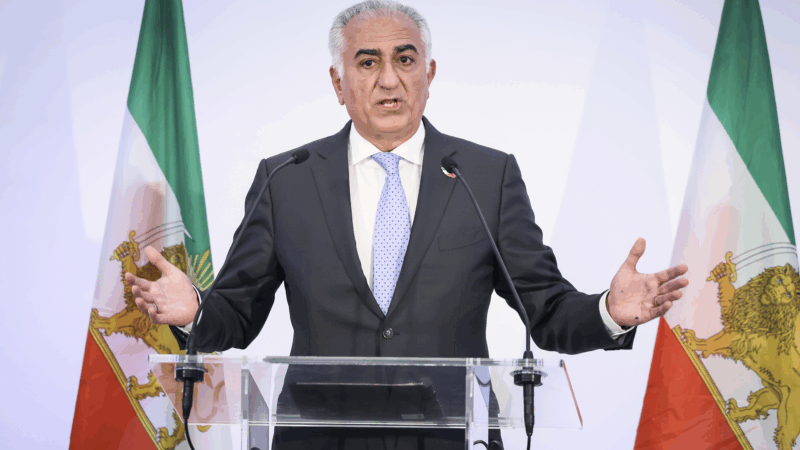What happens when a Chicago hospital bows to federal pressure on trans care for teens
If you or someone you love is experiencing a crisis, call or text 9-8-8 for the Suicide and Crisis Lifeline.
He’s 17 and lives in the Chicago suburbs. He loves theater and recently helped direct a play at his high school. He takes competitive AP courses and is working on his Eagle Scout project.
And he’s been on a journey for four years.
Once a week, the transgender teen injects testosterone into his body. He’s already frozen his eggs in case he wants to have his own biological children one day. He talked with his parents and his psychologist and decided he was ready for the next step of treatment: top surgery to remove breast tissue.
“Getting this treatment isn’t fixing something that’s wrong with me,” said the teen. “It’s just helping me grow more into who I want to be and who I can feel most comfortable existing as.”
NPR is not identifying the teen by name — or using his mother’s last name — because they are concerned he could be targeted for being transgender.
His mom, Jane, waited for a call to schedule the surgery at Ann & Robert H. Lurie Children’s Hospital. Then, she received a voicemail from the hospital. Before she even listened to it, she knew what they would say — the surgery wouldn’t happen.
She had already read on social media that Lurie, which is located near downtown Chicago, would no longer perform gender care surgeries for youth younger than 19 in the wake of an executive order from President Trump.
Jane called Lurie back to confirm that surgeries were on hold, then told her son when he got home from school that day.
“I said, ‘Hey, we are going to take care of you,'” she recalled. “‘We will make it through this.'”
It was devastating, Jane said.
“We are being threatened,” she said. “The trans community is being threatened and parents are being threatened. … We will do what we need to do to take care of our children.”

Her son feels hurt and confused. His doctors told him after Trump was elected in November that they would fight as hard as they legally could to support him, he recalled. But then Lurie’s leaders decided to cancel pending surgeries and stop scheduling new ones.
“I know that it’s not like a personal thing, like they didn’t look at me directly and go, ‘Yeah, you don’t deserve that,'” the teen said. “But it kind of feels like it sometimes, especially when a lot of what the sentiment has been, in general, towards trans people in society.”
On Feb. 7, a Lurie spokeswoman confirmed the hospital would pause gender care surgeries.
NPR spoke with 10 patients or their parents in the Chicago area about how this will affect their lives. They described their disappointment, their loss of hope for one day having a procedure, and their anger at the timing, when they already feel threatened and marginalized by hateful rhetoric around the country.
These families fear that they eventually could lose access to all gender-affirming care, such as therapy, puberty blockers and hormones. They’ve also questioned why Illinois state officials who have vowed to protect transgender rights have been quiet on what’s happening at Lurie and elsewhere. Northwestern Memorial Hospital in Chicago has also stopped surgeries for minors, families tell NPR.

Lurie’s decision came after Trump’s executive order on Jan. 28 threatened to cut federal funding to health care providers offering gender-affirming medical care.
“Across the country today, medical professionals are maiming and sterilizing a growing number of impressionable children under the radical and false claim that adults can change a child’s sex through a series of irreversible medical interventions,” according to Trump’s order. “This dangerous trend will be a stain on our Nation’s history, and it must end.”
Another patient, a 16-year-old boy from Chicago, had a surgery date for a double mastectomy procedure — until Lurie canceled it. NPR is not identifying him because he fears for his personal safety.
The teen felt betrayed by the cancellation, he said. He has been binding his chest for more than five years, but doing that causes rib and back pain.
Every morning, he faces a choice: bind his chest to fully “pass” as male, or skip that in order to experience a day without pain. He avoids sports because he can’t breathe as well when his chest is bound. A large part of his gender dysphoria is centered on having breasts, he said.
Lurie deemed the teen’s surgery “medically necessary,” according to medical documents his family shared with NPR.
“Lurie’s decision set a precedent not only for other care providers but also for their patients,” said the teen. “They have established that they are no longer the safe haven they have claimed to be for so many years.”
Many of Lurie’s patients were referred for surgery to Northwestern Memorial Hospital, a prominent research hospital near Lurie. Their initial Northwestern appointments were later canceled. A Northwestern spokesman did not answer questions from NPR.
Parents whose transgender children are receiving other types of medical care at Lurie, such as hormone therapy, worry about what the hospital might stop providing next.
“If we can’t get estrogen in a year, what do we do?” says the mother of a 15-year-old transgender girl, whom NPR is not naming because she fears retaliation against her daughter if she is identified. “Parents with means are talking about leaving the country.”
The politics of pausing surgeries
In a statement, Dr. Robert Garofalo said he hears and understands the frustration. He is the founding director of the Gender Development Program at Lurie.
“My life’s work has been devoted to these children, adolescents, and their families,” Garofalo wrote. “As someone who has spent his entire career at Lurie Children’s, I can assure you these kids and these families matter to this institution. It’s important to know that this decision was painstakingly difficult, and it was made amid unprecedented circumstances and external pressures.”
The hospital’s decision, Garofalo wrote, was based on a belief that it could help safeguard the majority of clinical services offered by Lurie’s gender development program.
Surgery among trans youth is rare, researchers have found.
After Trump’s executive order, Illinois Attorney General Kwame Raoul and 14 of his peers in other states vowed to protect access to treatment. In the statement, Raoul said in Illinois, the Human Rights Act prohibits health care providers from discriminating against patients because of their gender identity.
But a spokeswoman for Raoul did not answer questions from NPR about how the attorney general is enforcing the law.
When NPR asked if Lurie is violating the Human Rights Act, Democratic Gov. JB Pritzker didn’t answer. But he did say hospitals are being “blackmailed” into limiting care.
“This is not the hospitals’ fault,” Pritzker said. “Believe me. I know the people at Lurie Children’s Hospital, I know the people who run most of these hospitals, and I can tell you that they want to do the right thing for their patients.”
Lurie and some hospitals across the country paused surgeries or other types of gender-affirming treatment despite federal judges who issued rulings blocking Trump’s order.
A hospital confronts an uncertain legal future
Lurie has one of the oldest gender care programs in the country, launched in 2013, and still is offering hormone therapy, puberty blockers and behavioral health services.
Medical providers, patients and parents point to research that underscores the crucial and even lifesaving role that transgender medical care can provide, such as helping decrease depression and anxiety. Access to gender-affirming care is supported by the American Academy of Pediatrics and the American Medical Association.
The transgender community is small, and families say they feel targeted because of this. In 2023, around 3% of high school students in the U.S. identified as transgender, and another 2% identified as questioning, according to a 2023 study from the federal Centers for Disease Control and Prevention.
Transgender youth experience more violence, bullying and suicidal thoughts compared to their peers, the CDC study found. One in four students who were transgender or questioned their gender identity attempted suicide in the past year, the study found.
In recent years, many states have cracked down on access to youth gender-affirming care for minors, according to KFF, a nonpartisan health policy research organization. Just over half the country — 27 states — ban or restrict access. Recently, Iowa took the step of stripping civil rights protections from people who are trans and nonbinary.
Dr. Elizabeth Mack, a pediatric critical care physician in South Carolina, has witnessed the consequences of a ban in her state. She has treated several children who attempted suicide or died by suicide because they couldn’t access treatment, according to conversations she had with the patients or family members.
“It’s just one of those things that leaves a mark that I can’t unsee,” Mack said of her experience.
This teen already had his surgery but still worries
Ben Garcia, 18, a Chicago high school senior, offers a glimpse into life post-surgery. In 2023, he had a double mastectomy. He believes that without the medical care he’s received for the last several years, he would be a different person, likely more withdrawn and less confident.
“This care has allowed me to be a lot more comfortable in who I am, in the way that I present myself to the world,” Garcia said.
Garcia and his mother, Michelle Vallet, emphasized that his path to surgery was a slow process that proceeded with care and deliberation. Once puberty started, Garcia started to have questions and wanted to explore what it would mean to delay the changes occurring in his body. At that time, he was around 10 or 11 years old.
Vallet reached out to Lurie Children’s Hospital and booked a first appointment for Garcia. It lasted three hours, she said.
Much of the public misunderstands the process, Vallet said, and transgender kids have become some of the most scrutinized patients in America.
“I think they feel like trans kids are just one day waking up saying, ‘I want to be a boy,'” Vallet said. “They go to the gender clinic, wham bam. That’s not how this care happens.”

She, her son and medical staff at Lurie talked through the risks of treatment, the possible side effects and the next steps.
Garcia went through mental health evaluations over multiple appointments before he could take puberty blockers to stop his body from going through changes.
Then he started taking low doses of testosterone, a hormone. Gradually, his voice dropped and he grew facial hair.
Garcia still takes testosterone shots every week and gets checkups at Lurie to monitor his hormone levels.
He’s now nervous this care could also be affected. His mother is worried that Lurie might suspend all types of gender-affirming care.
“It’s heartbreaking to see hospitals as big as Lurie comply in advance,” Vallet said, referring to the executive order’s threats to cut hospital payments. “It feels like a betrayal … There’s federal dollars on the line, but at a certain point in the environment we’re in, you have to say, ‘No, I’m not doing this.’ “
The suburban 17-year-old who never got a surgery date is waiting to hear back from other hospitals. So far he has a preliminary appointment booked at one hospital — but it’s not until 2026.
He’s convinced the medical care he’s already received so far has saved his life and given him hope for his future. He thinks about studying medicine in college, inspired by the medical care he’s received.
His mom, Jane, said he’s thriving.
“I’m really proud of him, because he just makes sense,” Jane said as her son described all that’s involved in being able to have surgery. “He makes sense, and people are listening to him make sense and giving him what he needs to exist.”
This story comes from NPR’s health reporting partnership with WBEZ and KFF Health News.
Transcript:
AYESHA RASCOE, HOST:
In the flurry of executive orders issued by President Trump, there was one targeting hospitals that provide gender-affirming care for young people. In response, many of the hospitals have stopped or pulled back on certain treatments. That includes Lurie Children’s Hospital in Chicago. Kristen Schorsch, at member station WBEZ, has been tracking the ripple effects on patients and their families.
KRISTEN SCHORSCH, BYLINE: He’s a teenager in the Chicago suburbs. He loves theater and is working on his Eagle Scout project, and he’s been receiving treatment for the past four years.
UNIDENTIFIED PERSON #1: Getting this treatment isn’t fixing something that’s wrong with me. It’s just helping me grow more into who I want to be and who I can feel most comfortable existing as.
SCHORSCH: NPR is not identifying the 17-year-old or his mom because they fear he will be targeted for being transgender. He injects testosterone once a week. He’s already frozen his eggs, in case he wants to have his own biological kids one day. The next step was scheduling top surgery at Lurie Children’s Hospital, but then his mom got a voicemail from the hospital.
UNIDENTIFIED PERSON #2: And I was, like, oh, no. I could feel in the pit of my stomach that I, like, knew what it was.
SCHORSCH: The surgery was off. Lurie is near downtown Chicago. It is one of the oldest gender-care programs in the country. Trump’s executive order says that care amounts to chemical and surgical mutilation. It also indicated that if hospitals don’t comply, they could lose crucial federal funding, and more than half of Lurie’s revenue comes from Medicaid. The hospital’s decision left the 17-year-old hurt and confused. He says he had asked his doctors before what they would do if this change came.
UNIDENTIFIED PERSON #1: All of their responses were, we will fight as hard as we can legally. We will try to push it back as much as we can. And then they go ahead and cancel it themselves. Like, they weren’t forced to do that.
SCHORSCH: Two federal judges have already ruled that the executive order is not enforceable, but Lurie has not resumed surgeries. In Illinois, there’s also a state law that says it’s illegal to discriminate against patients because of their gender identity. So is Lurie violating that state law? Neither the state’s attorney general nor Governor JB Pritzker would say. Pritzker, who is a Democrat, did tell NPR he thinks hospitals are being blackmailed into limiting care.
JB PRITZKER: Believe me, I know the people at Lurie Children’s Hospital. I know the people who run most of these hospitals, and I can tell you that they want to do the right thing for their patients.
SCHORSCH: After Lurie’s decision, hundreds protested outside.
UNIDENTIFIED PROTESTERS #1: (Chanting) If trans kids are under attack, what do we do?
UNIDENTIFIED PROTESTERS #2: (Chanting) Stand up. Fight back.
SCHORSCH: Twenty-seven states limit or ban gender-affirming care for minors. That includes South Carolina, where Dr. Elizabeth Mack works. She has treated younger trans patients who ended up in the ICU when they couldn’t get care.
ELIZABETH MACK: And they come in either attempting or dying by suicide. It’s just one of those things that leaves a mark that I can’t unsee.
SCHORSCH: Lurie has only paused surgeries, not therapy or other treatments, but some parents in Chicago worry about what comes next. Michelle Vallet’s son Ben Garcia takes testosterone shots every week and gets checkups at Lurie.
MICHELLE VALLET: There’s not a family probably at Lurie that is confident that Lurie isn’t going to fold on all of the care. I know you don’t have my son’s back.
SCHORSCH: Dr. Robert Garofalo started the gender-care program at Lurie Children’s. In a statement, he said, quote, “this decision was painstakingly difficult, and it was made amid unprecedented circumstances and external pressures,” unquote. He says Lurie stopped surgeries so that they can keep offering the other treatments, like hormones and puberty blockers. Surgery is just one option for minors, and it’s rare.
Ben Garcia started going to Lurie when he was 10 or 11. Therapists evaluated his mental health over multiple appointments before starting each new treatment. When Garcia was 16, he had a double mastectomy. Without that top surgery, he says…
BEN GARCIA: I would have been more withdrawn, less confident in, like, myself. This care has allowed me to be a lot more comfortable in who I am and the way that I present myself to the world.
SCHORSCH: Now Garcia’s 18 and headed to college in the fall. Still, his mom and other families feel betrayed by Lurie.
VALLET: I can have compassion and understanding that it’s economic, too, right? But at a certain point, in the environment we’re in, you have to say, no, I’m not doing this.
SCHORSCH: After Lurie canceled their surgeries, many patients were referred to Northwestern Memorial Hospital. But after booking appointments there, Northwestern canceled those, too.
For NPR News, I’m Kristen Schorsch in Chicago.
RASCOE: This story comes from NPR’s partnership with WBEZ and KFF Health News.
Bob Weir, guitarist and founding member of the Grateful Dead, has died at 78
For three decades with the Grateful Dead and three more after the group ended following the 1995 death of his bandmate Jerry Garcia, Weir helped build and sustain the band's legacy across generations.
Nationwide anti-ICE protests call for accountability after Renee Good’s death
Activist organizations are planning at least 1,000 protests and vigils this weekend. Officials in major cities cast Saturday's demonstrations as largely peaceful.
Veteran actor T.K. Carter, known for ‘The Thing’ and ‘Punky Brewster,’ dies at 69
T.K. Carter gained fame as Nauls the cook in John Carpenter's 1982 horror classic, "The Thing."
Who is Reza Pahlavi, the exiled Crown Prince encouraging demonstrations across Iran?
In exile for nearly 50 years, Iran's Crown Prince Reza Pahlavi has issued calls urging Iranians to join protests sweeping the country. But support for him may not be clear cut.
US launches new retaliatory strikes against ISIS in Syria after deadly ambush
The U.S. has launched another round of strikes against the Islamic State in Syria. This follows last month's ambush that killed two U.S. soldiers and an American civilian interpreter.
6 killed in Mississippi shooting rampage, authorities say
The alleged gunman, 24, has been charged with murder after the Friday shootings in northeast Mississippi. The victims include his father, uncle, brother and a 7-year-old relative, authorities said.






